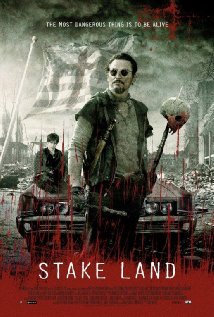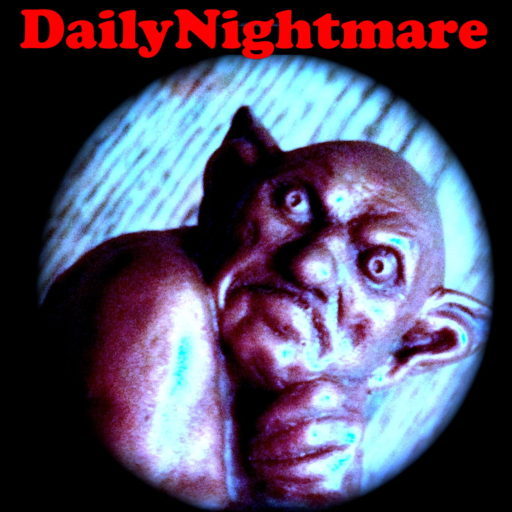 “Stake Land” hit me like a hammer of wonderful. I was not expecting to love it. Any hopes I had for the end of the world soured months ago and I officially declared the apocalypse so “yesterday” However, this indie horror flick makes me add an exception. What first struck me were the visuals. The film felt like film both due to image quality and the thoughtful establishing shots that plumped out the locations. The milieu felt really familiar, really rust belt and post industrial. It wasn’t shot in the Midwest technically but except for a few mountains, it felt like home.
“Stake Land” hit me like a hammer of wonderful. I was not expecting to love it. Any hopes I had for the end of the world soured months ago and I officially declared the apocalypse so “yesterday” However, this indie horror flick makes me add an exception. What first struck me were the visuals. The film felt like film both due to image quality and the thoughtful establishing shots that plumped out the locations. The milieu felt really familiar, really rust belt and post industrial. It wasn’t shot in the Midwest technically but except for a few mountains, it felt like home.
The main characters were all strongly conceived and portrayed. Obviously the heroic “Mister” is the defining core — yeah, yeah, structurally speaking the kid he saves is the protagonist– and yeah, the overall thrust of the movie is a bildungsroman for this youngun, complete with separation from natal household, learned independence, sexual awakening and (spoiler) re-establishment of a new household. The kid character is good, central even but damn, Mister is da MAN. Supporting characters are excellent. There’s a rescued nun, a pregnant singer, an ex-marine… and what compelling narrative would be complete without an ape-shit bad guy?
Religion and its bizarre perversions formed an essential thematic strata of Stake Land a detail that made it particularly vivid. America is daft already when it comes to the variety and ingenuity of our faith-based practices. The end of normal society could only make those oddities accelerate outward. I particularly enjoyed the suggestion of a suicide cult during one scene since it was nicely understated, not to mention that it goes in a completely different direction than I’d expected.
“Stake Land” compares favorably to the film version of “The Road.” Both are beautiful to look at. Both chronicle the decay of American civilisation and the desperate attempts to retain a sense of family in the face of such devastation. Both films end on at least a whisper of optimism. But I’ll take “Stake Land” over “The Road.” It comes down to something that I believe Nick Mamatas noted when explaining the difference between genre and literary fiction: in genre stories, something happens. Too often “literary” writing and “auteurist” cinema specifically repress story and plot as they focus on the elements of mood, character, theme. A film like “Stake Land,” modest though it may be, is a strong reminder that movies can be both poetic AND entertaining.
And if all that weren’t enough already, there were no zombies. Aren’t we over zombies yet? The vampires in “Stake Land” provided different levels of threat. They weren’t quite the über-beasts of “30 Days of Night” but they were happily far from the urbane and decadent artistocrats of “Interview with a Vampire.” I loved the sense that there was a taxonomy of vampire types known to the hunters; “scamps” were young ones, “berserkers” were older, more dangerous. Perhaps my favorite touch was how Mister collected the fangs from his kills and better, how those fangs functioned as currency.
I have no idea what angel of dark cinema spirited “Stake Land” to me but I am deeply grateful. I had been wallowing in a morass of joke-ridden, childish home movies masquerading as horror. “Stake Land” reminded me that mature and reflective grown ups make scary movies too.
